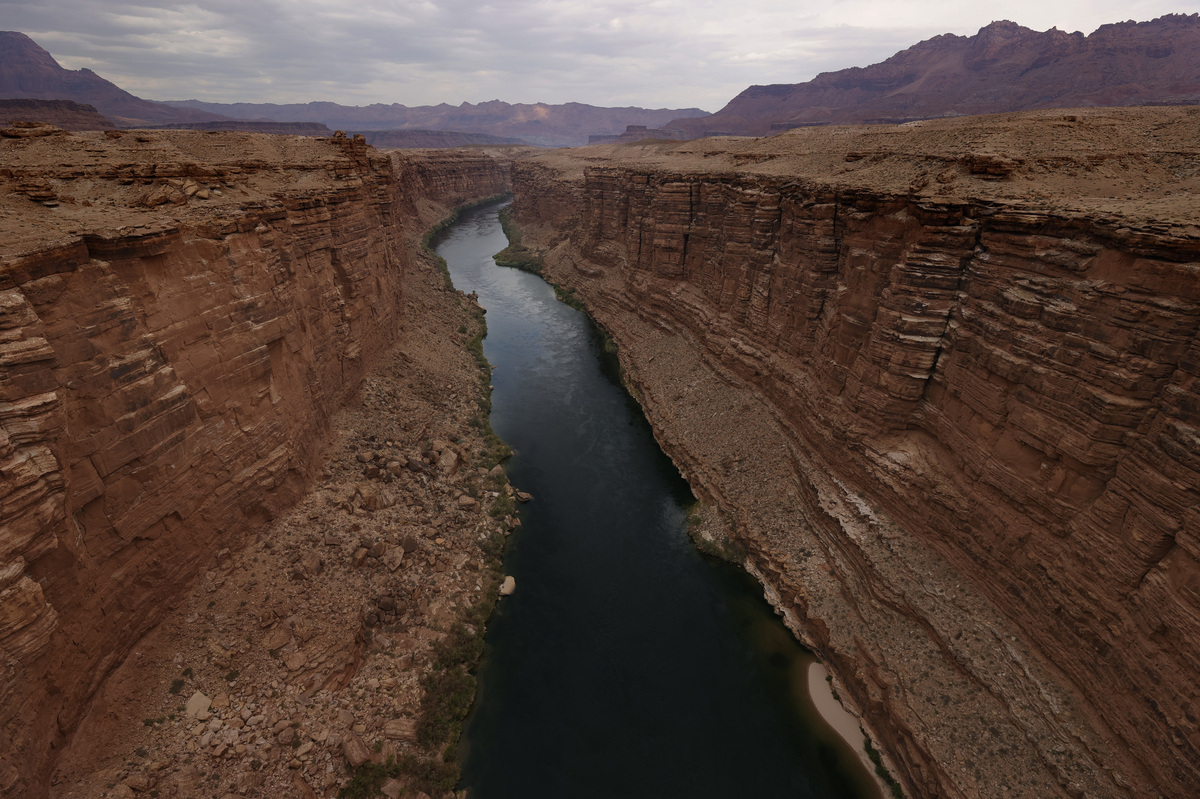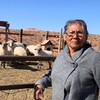
[ad_1]

The Colorado River flows by the historic Navajo Bridge on June 23, 2021 in Marble Canyon, Ariz.
Justin Sullivan/Getty Images
disguise caption
toggle caption
Justin Sullivan/Getty Images

The Colorado River flows by the historic Navajo Bridge on June 23, 2021 in Marble Canyon, Ariz.
Justin Sullivan/Getty Images
On Monday, the U.S. Supreme Court heard arguments in a case that would alter the already intense battle over water rights within the parched American Southwest.
For greater than 20 years, the Navajo Nation has fought for entry to water from the decrease Colorado River, which flows immediately alongside the reservation’s northwestern border.
The Navajo Nation reservation stretches throughout 27,000 sq. miles in Arizona, Utah and New Mexico, Almost a 3rd of the 170,000 individuals who reside there don’t have entry to wash, dependable ingesting water, the tribe says.
Thousands who reside with out working water must drive for miles to refill barrels and jugs to haul water residence for ingesting, cooking, bathing and cleansing. Others depend on unregulated wells.
But the problem of entry to the Colorado River is extraordinarily contentious.
A decades-long drought, exacerbated by local weather change, has created the driest situations that the American Southwest has seen in centuries. The area’s water provide is dwindling as its inhabitants and agricultural output have boomed.
The river, which offers water for 40 million folks throughout the whole Southwest, is already overtapped. The seven states that depend on the river have lengthy been embroiled in litigation over the physique of water. Recently, they have struggled to reach an agreement on how to cut back on their water use.
But the Navajo Nation says it has not been in a position to absolutely signify its personal pursuits in disputes over water. Instead, they are saying they have been blocked in courtroom by the U.S. federal authorities, which says it represents tribal pursuits in water disputes.
The tribe’s declare stems from federal insurance policies that forcibly relocated tribes and their residents westward and onto reservations, together with the Navajo Treaty of 1868, said Heather Tanana, a legislation professor on the University of Utah.
“When they established these reservations, that came with the promise that those lands would be permanent homelands for the tribe and their people,” mentioned Tanana, who’s a citizen of Navajo Nation. “And I think everyone would agree you can’t have a homeland of any kind without water.”
Both the tribe and the U.S. authorities agree that Indian reservations, together with the Navajo Nation, have a proper to water.
Now, the Supreme Court should resolve how far the federal authorities’s obligations go in reserving that proper.
“Is the federal government the trustee and the Navajo Nation the beneficiary, such that ordinary trust law principles can be applied?” said Gregory Ablavsky, who focuses on federal Indian legislation at Stanford Law School. Ordinarily, he defined, a beneficiary can sue a trustee for mismanaging the belief — on this case, water.
Sympathy for the tribe’s place got here from Justice Neil Gorsuch, a frequent supporter of Native rights who has usually cut up from his fellow conservatives on instances involving Indian treaties.
“Could I bring a good breach-of-contract claim for someone who promised me a permanent home, the right to conduct agriculture and raise animals if it turns out it’s the Sahara Desert?” Gorsuch requested throughout Monday’s oral arguments. (No, the federal government’s lawyer replied.)
The U.S. has argued {that a} broad ruling in favor of the Navajo Nation may power the federal authorities to conduct an evaluation of the tribe’s water wants and construct water provide infrastructure. Those obligations belong to the tribe, the federal government says.
“Just as the 1868 treaty didn’t impose on the United States a duty to build roads or bridges, or to harvest timber, or to mine coal, the 1868 treaty didn’t impose on the United States a duty to construct pipelines, pumps or wells to deliver water,” mentioned Frederick Liu, an assistant to the solicitor normal, addressing the courtroom.
Several of the courtroom’s conservatives, together with Justices Samuel Alito and Brett Kavanaugh, appeared delicate to that concern throughout Monday’s listening to, which prompted assurances from Shay Dvoretzky, the lawyer arguing on behalf of the Navajo Nation.
“The government hypothesizes a parade of horribles where the government would have to be building pipelines across miles and miles and miles of territory,” Dvoretzky mentioned. “We’re not talking about anything like that.”
States that depend on the Colorado River — together with Arizona, California and Nevada — additionally oppose the tribe’s efforts, saying that diverting water to the reservation would come on the expense of their states’ populations and economies.
A good ruling wouldn’t instantly clear up the tribe’s water entry points, specialists mentioned. But it could permit the tribe’s authorized efforts across the Colorado River and different waterways to maneuver ahead.
“There isn’t enough water. But that doesn’t mean that the Navajo Nation does not have valid rights that should be enforced, that they should have the ability to develop their water and then play on the same level with every other stakeholder in the basin,” mentioned Tanana of the University of Utah.
[adinserter block=”4″]
[ad_2]
Source link




